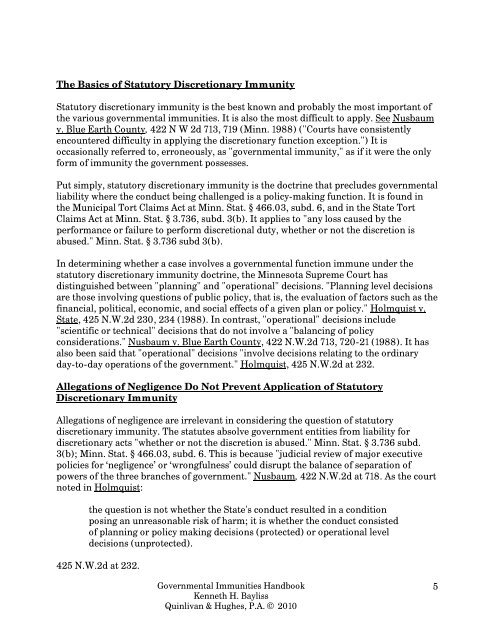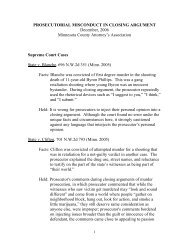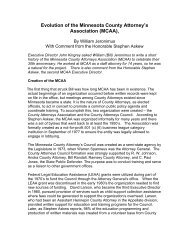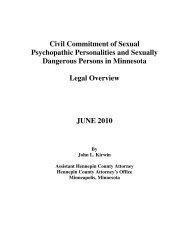Governmental Immunities: - Minnesota County Attorneys Association
Governmental Immunities: - Minnesota County Attorneys Association
Governmental Immunities: - Minnesota County Attorneys Association
Create successful ePaper yourself
Turn your PDF publications into a flip-book with our unique Google optimized e-Paper software.
The Basics of Statutory Discretionary Immunity<br />
Statutory discretionary immunity is the best known and probably the most important of<br />
the various governmental immunities. It is also the most difficult to apply. See Nusbaum<br />
v. Blue Earth <strong>County</strong>, 422 N W 2d 713, 719 (Minn. 1988) ("Courts have consistently<br />
encountered difficulty in applying the discretionary function exception.") It is<br />
occasionally referred to, erroneously, as "governmental immunity," as if it were the only<br />
form of immunity the government possesses.<br />
Put simply, statutory discretionary immunity is the doctrine that precludes governmental<br />
liability where the conduct being challenged is a policy-making function. It is found in<br />
the Municipal Tort Claims Act at Minn. Stat. § 466.03, subd. 6, and in the State Tort<br />
Claims Act at Minn. Stat. § 3.736, subd. 3(b). It applies to "any loss caused by the<br />
performance or failure to perform discretional duty, whether or not the discretion is<br />
abused." Minn. Stat. § 3.736 subd 3(b).<br />
In determining whether a case involves a governmental function immune under the<br />
statutory discretionary immunity doctrine, the <strong>Minnesota</strong> Supreme Court has<br />
distinguished between "planning" and "operational" decisions. "Planning level decisions<br />
are those involving questions of public policy, that is, the evaluation of factors such as the<br />
financial, political, economic, and social effects of a given plan or policy." Holmquist v.<br />
State, 425 N.W.2d 230, 234 (1988). In contrast, "operational" decisions include<br />
"scientific or technical" decisions that do not involve a "balancing of policy<br />
considerations." Nusbaum v. Blue Earth <strong>County</strong>, 422 N.W.2d 713, 720-21 (1988). It has<br />
also been said that "operational" decisions "involve decisions relating to the ordinary<br />
day-to-day operations of the government." Holmquist, 425 N.W.2d at 232.<br />
Allegations of Negligence Do Not Prevent Application of Statutory<br />
Discretionary Immunity<br />
Allegations of negligence are irrelevant in considering the question of statutory<br />
discretionary immunity. The statutes absolve government entities from liability for<br />
discretionary acts "whether or not the discretion is abused." Minn. Stat. § 3.736 subd.<br />
3(b); Minn. Stat. § 466.03, subd. 6. This is because "judicial review of major executive<br />
policies for ‘negligence’ or ‘wrongfulness’ could disrupt the balance of separation of<br />
powers of the three branches of government." Nusbaum, 422 N.W.2d at 718. As the court<br />
noted in Holmquist:<br />
the question is not whether the State's conduct resulted in a condition<br />
posing an unreasonable risk of harm; it is whether the conduct consisted<br />
of planning or policy making decisions (protected) or operational level<br />
decisions (unprotected).<br />
425 N.W.2d at 232.<br />
<strong>Governmental</strong> <strong>Immunities</strong> Handbook<br />
Kenneth H. Bayliss<br />
Quinlivan & Hughes, P.A. © 2010<br />
5






